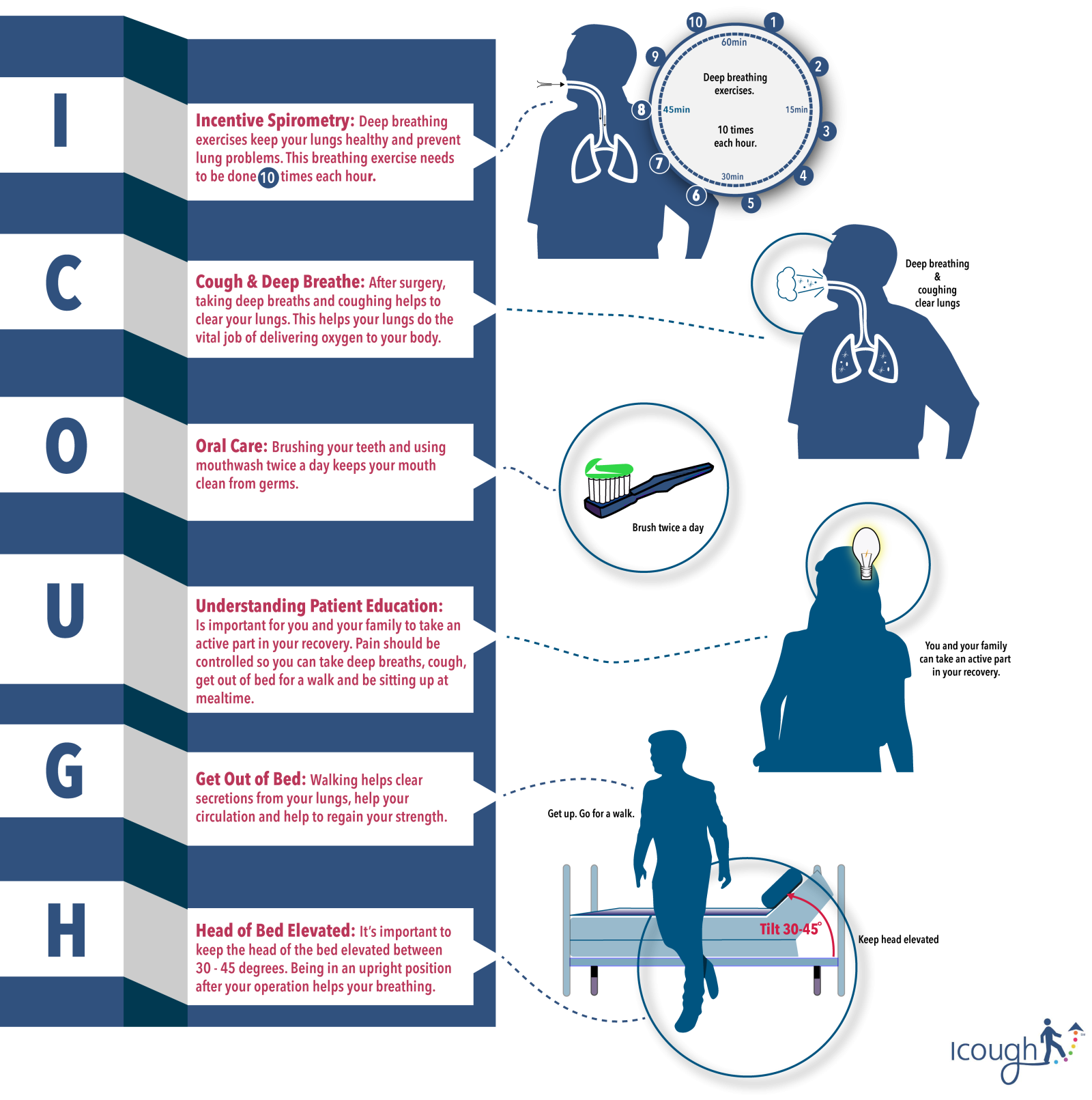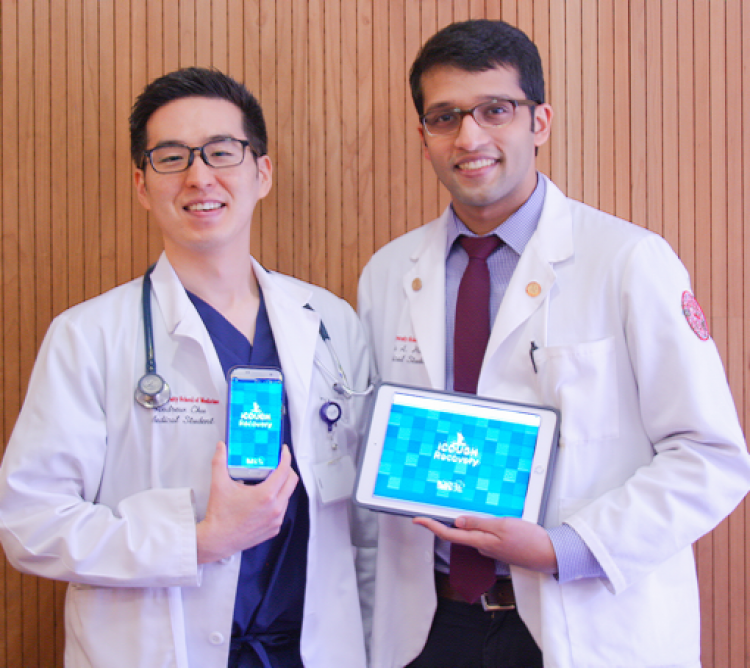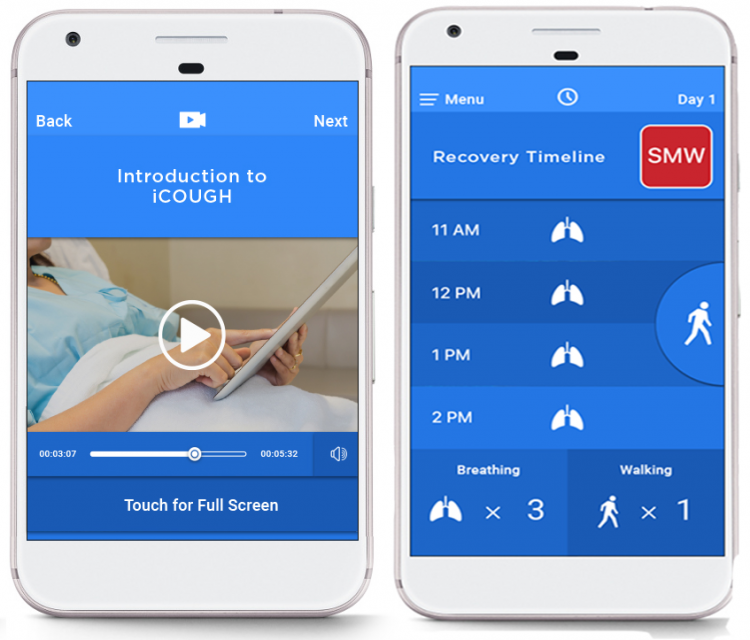BU medical students’ mobile app engages patients in post-op recovery
Key takeaways
The Concern
Some patients needed more coaching to take full advantage of Boston Medical Center’s I COUGH program, which helps avoid pulmonary complications after operations.
The Response
Boston University medical students Andrew Chu and Samir Haroon designed a smartphone app to help patients engage in the I COUGH protocol.
(l to r) Drs. Andrew Chu and Samir Haroon
The Recognition
The I COUGH app won a Health Devices Achievement Award given annually by ECRI Institute.
The Current and Future Plans
Hospitals may contract with Boston Medical Center to implement I COUGH with coaching from the surgery department’s Director of Clinical Quality and Patient Safety. BMC is working toward making the program publicly available in the future.
As Boston University medical students doing their surgery rotations at Boston Medical Center (BMC), Andrew Chu and Samir Haroon witnessed both the benefits and limitations of I COUGH, a program designed to reduce the likelihood of pulmonary complications after operations. A few years later, they developed a smartphone app to address one limitation by engaging patients in the I COUGH protocol. The app won a Health Devices Achievement Award given annually by ECRI Institute, a renowned non-profit patient safety research organization, to acknowledge innovative and effective health technology initiatives that improve patient safety.

Medical students sensed a need
Chu and Haroon saw that many patients at BMC, the largest safety net hospital in New England, needed more coaching to fully benefit from I COUGH. Lack of English language proficiency was often a barrier.
With prior experience at a digital health startup, Chu and Haroon thought a mobile app that engaged patients in their native languages and added incentives and encouragement could improve participation. After testing their ideas drawn as storyboards on paper, they recruited a software engineer and user-interface designer to help with the project. Together, the team developed a mobile app that patients download on their personal smartphones (for now, Android only). Chu is excited about what is possible with new trends in health care:
"Multidisciplinary partnerships are so crucial in healthcare today. You cannot expect someone to know everything — clinical care, technology and design — but with the right pool of people, you can do anything."
The app reminds patients to comply with I COUGH activities, encourages them to enlist a care coach from their contacts list, and allows them to confidentially compare their progress to other patients. Chu says he and Haroon wanted to make I COUGH more fun and engaging for patients.
Chu and Haroon started developing the mobile app in 2016. BMC surgeons began testing the app, which is available in English and Spanish, in 2017 with a proof-of-concept study that has involved 17 patients so far. Feedback from patients is positive, and results have been encouraging.
App is one piece of a complete prevention program
The original I COUGH program, which was implemented in 2010 for all patients recovering from operations on the General Surgery and Vascular Surgery services, resulted in reduced rates of postoperative pneumonia and unplanned intubation. At one time, BMC offered access to I COUGH tools on its website but discovered that staff at some hospitals used parts of the program in isolation. Pam Rosenkranz, Director of Clinical Quality and Patient Safety for BMC’s Department of Surgery, says, “We want hospitals to be successful with the program, not implement it in a piecemeal fashion. I COUGH is a complete pulmonary complications prevention program, not just a cute acronym.”
Hospitals may contract with BMC to implement I COUGH, with coaching from Ms. Rosenkranz. Patient education videos and brochures are available in English, Spanish, Portuguese, Haitian Creole, and Vietnamese, the languages spoken most often by BMC patients.
The I COUGH patient education video is available in four languages.
Vice Chair of Surgery David McAneny, M.D., says BMC wants to make the app publicly available, “for the benefit of all,” once it is ready and the hospital has worked out the details.
Meanwhile, Chu and Haroon’s experience may provide inspiration for others to solve problems with digital apps. Although developing and testing the app has been a big project, Chu and the rest of the I COUGH team encourage other organizations to consider taking a similar approach.
Chu reflects:
Until very recently, Samir and I were medical students with no prior experience building mobile apps, but we were passionate about improving care with digital technology. We pooled our clinical experience with that of colleagues who know technology and built the app from scratch. It is do-able and so exciting.

